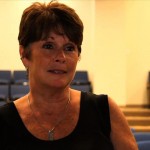In St. Louis, Roni Chambers and I read at a regular Tuesday morning meeting for the GO Network. Roni’s story is particularly special as she worked as an HR executive who had the task of ‘separating… a couple hundred people’ before she was laid off by the same company. After that experience she didn’t want to put herself through the process of applying for a job and writing a resume for the first time in decades so she reconfigured her life to a more modest financial plan and assumed the (volunteer) position of Executive Director at the GO Network. GO is a non-profit organization that provides free membership to the unemployed who are seeking a place to meet employers, develop interviewing skills, improve resumes and ultimately land a new job. They meet in a downtown building surrounded by the mayhem of summer construction but the atmosphere inside is inviting and nurturing. And it’s clear to me now that if feels this way because Roni and her team of volunteers are inviting and nurturing.
This was a unique event because instead of stepping into a bookstore with interested readers, Roni and I were on a stage in front of a room filled with unemployed individuals. When I began reading from the introduction of the book, I could feel things tensing up a bit. I was giving an overview of my experience talking to the unemployed to a room of people who, frankly, did not need to be told what it was like to be unemployed—and might like to forget what it’s like to be unemployed. I could sense a tremendous discomfort in the air as Roni and I forced a conversation about the experience of a layoff—emotions and all.
It was Roni who saved the day with an open and raw reading of her chapter. She did so courageously and with a certain authority that seemed to give everyone in the room permission to take a deep breath. Once Roni finished reading we began a group discussion and, slowly and surely, hands all across the room started going up. It wasn’t so much that people were asking me questions as much as it was about everyone taking a minute or five or ten to tell a little something about their own experience with unemployment.
The two-hour session had a definite arch to it with an intensely trepidatious beginning and a communally energized ending. It reminded me of those two sentiments independently expressed by so many people I spoke to for the project—two ideas that initial seem to contradict each other. One, remembering the day of the layoff is hard and something that most would, initially, like to avoid. But, two, once that process of remembering and sharing begins the initial difficulty gives way to a feeling of release and gratitude.
When we wrapped up, Roni handed out evaluation forms to everyone in the room. One question asked each participant what she or he thought was the most positive part of the meeting. One individual simply wrote one word: “Healing.”
I can think of no greater outcome than that.
Onward.

